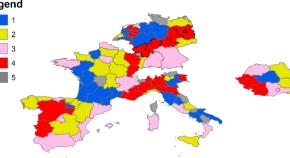Collection
Modelling Pandemic Impacts in Space
- Submission status
- Open
- Open for submission from
- 01 March 2022
- Submission deadline
- Ongoing
Editors
-
Pui-Hang Wong
Pui-Hang Wong is a development economist with a strong interest in interdisciplinary research. He has published papers on various topics related to wellbeing, regional development, migration and conflict psychology. His current research applies computational methods such as machine learning models to study ageing, mobility and health behaviours. He works at Maastricht University and UNU-MERIT, United Nations University in the Netherlands.
-
Karima Kourtit
Karima Kourtit is at the Open University of the Netherlands. Her main scientific research is in the field of creative industries, urban development, cultural heritage, digital technology, and strategic performance management. She has been an editor of several books and guest editor for many international journals, and has published a wide array of scientific articles, papers, special issues of journals and edited volumes in the field of geography and the spatial sciences. She is also managing director of The Regional Science Academy.
-
Peter Nijkamp
Peter Nijkamp is emeritus Professor in regional & urban economics and in economic geography at the VU University and associated with The Open University of the Netherlands and the Alexandru Ioan Cuza University of Iasi (Romania). He has published more than 2000 articles and books about regional development, urban growth, transport and the environment. He is a fellow of the Royal Netherlands Academy of Sciences, vice-president of The Regional Science Academy and has served as president of the governing board of the Netherlands Research Council. In 1996, he was awarded the most prestigious scientific prize in the Netherlands, the Spinoza award.
Articles (17 in this collection)
-
-
The impact of COVID-19 on tourism, employment, and population of the Azores islands
Authors
- Karina Simone Sass
- Raquel Ferreira Maciel
- Tomaz Ponce Dentinho
- Content type: Original Paper
- Open Access
- Published: 28 November 2023
- Article: 42

-
Assessing geographical differences of the COVID-19 impact on fuel consumption: the case of Italy
Authors (first, second and last of 4)
- Riccardo Borgoni
- Matteo Denova
- Caterina Morelli
- Content type: Original Paper
- Open Access
- Published: 25 October 2023
- Article: 38

-
Opioid mortality in the US: quantifying the direct and indirect impact of sociodemographic and socioeconomic factors
Authors
- Sucharita Gopal
- Manfred M. Fischer
- Content type: Original Paper
- Open Access
- Published: 13 July 2023
- Article: 29

-
Examining the impact of urban compactness on work and social life disruption during COVID-19 pandemic: evidence from Jakarta, Indonesia
Authors
- Usep Nugraha
- Budy P. Resosudarmo
- Rus’an Nasrudin
- Content type: Original Paper
- Open Access
- Published: 30 May 2023
- Article: 26

-
Initial signs of post-covid-19 physical structures of cities in Israel
Authors
- Nataliya Rybnikova
- Dani Broitman
- Daniel Czamanski
- Content type: Original Paper
- Published: 17 May 2023
- Article: 25

-
Local and regional factors of spatial differentiation of the excess mortality related to the COVID-19 pandemic in Romania
Authors
- Alexandru Bănică
- Ionel Muntele
- Content type: Original Paper
- Published: 17 May 2023
- Article: 23

-
The burden of big spaces: Russian regions and cities in the COVID-19 pandemic
Authors (first, second and last of 4)
- Boris Nikitin
- Maria Zakharova
- Nadezhda Zamyatina
- Content type: Original Paper
- Published: 12 April 2023
- Article: 16

-
On the bumpy road to recovery: resilience of public transport ridership during COVID-19 in 15 European cities
Authors (first, second and last of 4)
- Ouassim Manout
- Louafi Bouzouina
- Peter Nijkamp
- Content type: Original Paper
- Published: 03 April 2023
- Article: 14

-
The regional evolution of job insecurity during the first COVID-19 wave in relation to the pandemic intensity
Authors (first, second and last of 4)
- Bogdan-Constantin Ibanescu
- Mioara Cristea
- Gabriela Carmen Pascariu
- Content type: Original Paper
- Published: 27 March 2023
- Article: 13

-
Analysis of reporting lag in daily data of COVID-19 in Japan
Authors
- Taro Kanatani
- Kuninori Nakagawa
- Content type: Original Paper
- Published: 23 March 2023
- Article: 12
-
The impact of pandemics on labour organization: insights from an Italian company archive during the Spanish Flu
Authors
- Enrico Berbenni
- Stefano Colombo
- Content type: Original Paper
- Open Access
- Published: 17 March 2023
- Article: 11
-
Agent-based simulation of COVID-19 containment measures: the case of lockdowns in cities
Authors
- A. Yair Grinberger
- Daniel Felsenstein
- Content type: Original Paper
- Published: 17 March 2023
- Article: 10

-
Physical distancing as an integral component of pandemic response
Authors
- Alan T. Murray
- Susan Burtner
- Content type: Original Paper
- Published: 07 March 2023
- Article: 8

-
Institutional quality and COVID-19 vaccination: does decentralization matter?
Authors
- Chiara F. Del Bo
- Content type: Original Paper
- Open Access
- Published: 25 February 2023
- Article: 6

-
The economic impact of COVID-19 on the creative industries: a sub-regional input–output approach
Authors
- Matthew S. Lyons
- Content type: Original Paper
- Open Access
- Published: 24 February 2023
- Article: 4

-
The effects of the COVID-19 pandemic on U.S. entrepreneurship
Authors
- Oudom Hean
- Nattanicha Chairassamee
- Content type: Original Paper
- Published: 16 February 2023
- Article: 1





